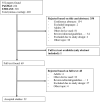Safety and Psychological Outcomes of Tandem t:Slim X2 Insulin Pump with Control-IQ Technology in Children, Adolescents, and Young Adults with Type 1 Diabetes: A Systematic Review
- PMID: 39008237
- PMCID: PMC11411026
- DOI: 10.1007/s13300-024-01618-2
Safety and Psychological Outcomes of Tandem t:Slim X2 Insulin Pump with Control-IQ Technology in Children, Adolescents, and Young Adults with Type 1 Diabetes: A Systematic Review
Erratum in
-
Correction to: Safety and Psychological Outcomes of Tandem t:Slim X2 Insulin Pump with Control-IQ Technology in Children, Adolescents, and Young Adults with Type 1 Diabetes: A Systematic Review.Diabetes Ther. 2024 Oct;15(10):2151. doi: 10.1007/s13300-024-01636-0. Diabetes Ther. 2024. PMID: 39141213 Free PMC article. No abstract available.
Abstract
The Tandem t:slim X2 insulin pump is a second-generation automated insulin delivery system with Control-IQ technology. It consists of an X2 insulin pump, an integrated Dexcom sensor, and an embedded 'Control-IQ' algorithm, which predicts glucose levels 30 min in the future, adapting the programmed basal insulin rates to get glucose levels between 112.5 and 160 mg/dl (8.9 mmol/l). The system delivers automatic correction boluses of insulin when glucose levels are predicted to rise > 180 mg/dl (10 mmol/l). It has been commercially available since 2016. We reviewed the current evidence about the psychological, safety, and exercise-related outcomes of this device in children, adolescents, and young adults living with type 1 diabetes. We screened 552 papers, but only 21 manuscripts were included in this review. Fear of hypoglycemia is significantly reduced in young people with diabetes and their parents. Interestingly, diabetes-related distress is decreased; thus, the system is well accepted by the users. The sleeping quality of subjects living with diabetes and their caregivers is improved to a lesser extent as well. Despite the small number of data, this system is associated with a low rate of exercise-related hypoglycemia. Finally, evidence from the literature shows that this system is safe and effective in improving psychological personal outcomes. Even if further steps toward the fully closed loop are still mandatory, this second-generation automated insulin delivery system reduces the burden of diabetes. It properly addresses most psychological issues in children, adolescents, and young adults with type 1 diabetes mellitus; thus, it appears to be well accepted.
Keywords: Advanced hybrid closed loop; Automated insulin delivery; Control-IQ technology; Fear of hypoglycemia; Physical activity; Quality of life; Sleeping quality; Tandem t:slim X2; Type 1 diabetes.
© 2024. The Author(s).
Conflict of interest statement
Chiara Mameli, Giulia Marie Smylie, Marco Marigliano, Luca Zagaroli, Valentina Mancioppi, Claudio Mafferis, Vincenzo Salpietro, and Gianvincenzo Zuccotti do not declare any competing interests. Maurizio Delvecchio is an Editorial Board member of
References
-
- Heinemann L, Freckmann G, Ehrmann D, et al. Real-time continuous glucose monitoring in adults with type 1 diabetes and impaired hypoglycaemia awareness or severe hypoglycaemia treated with multiple daily insulin injections (HypoDE): a multicentre, randomised controlled trial. Lancet. 2018;391(10128):1367–77. 10.1016/S0140-6736(18)30297-6. - DOI - PubMed
Publication types
LinkOut - more resources
Full Text Sources
Research Materials


